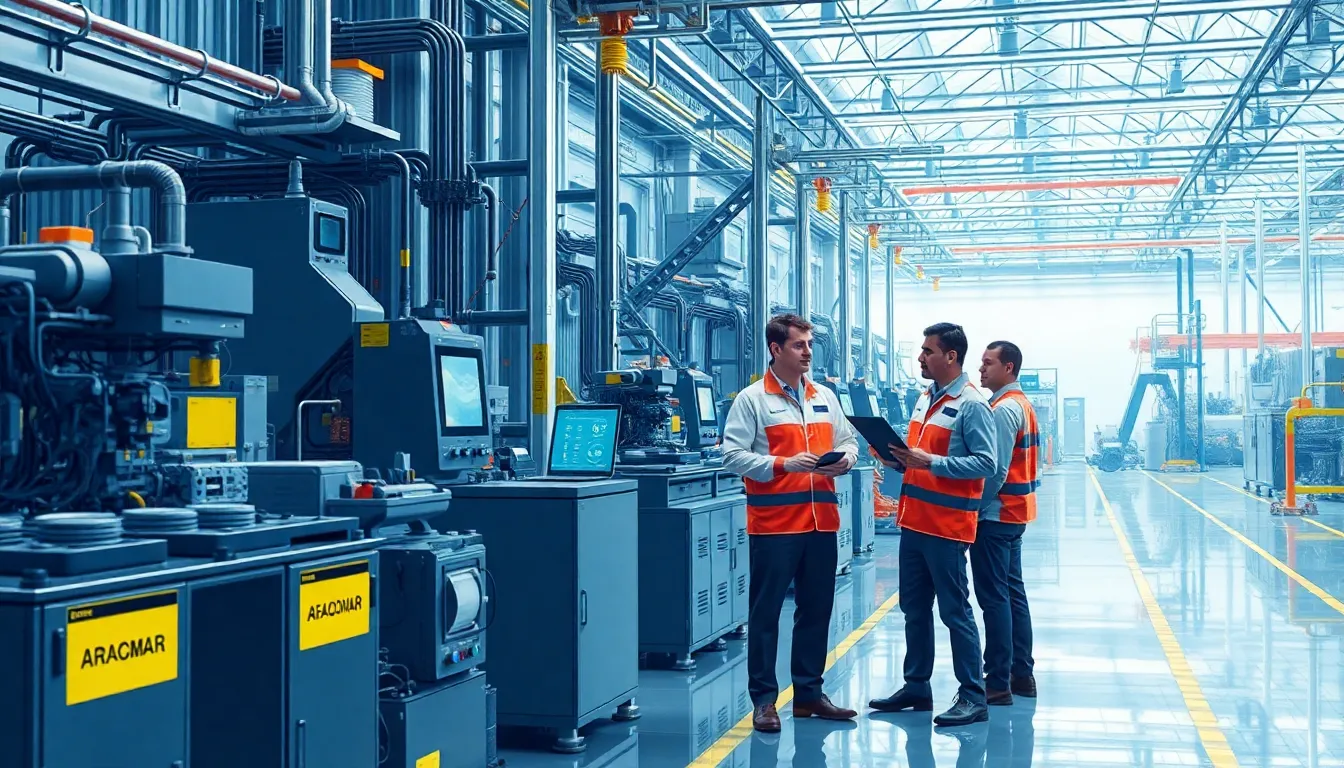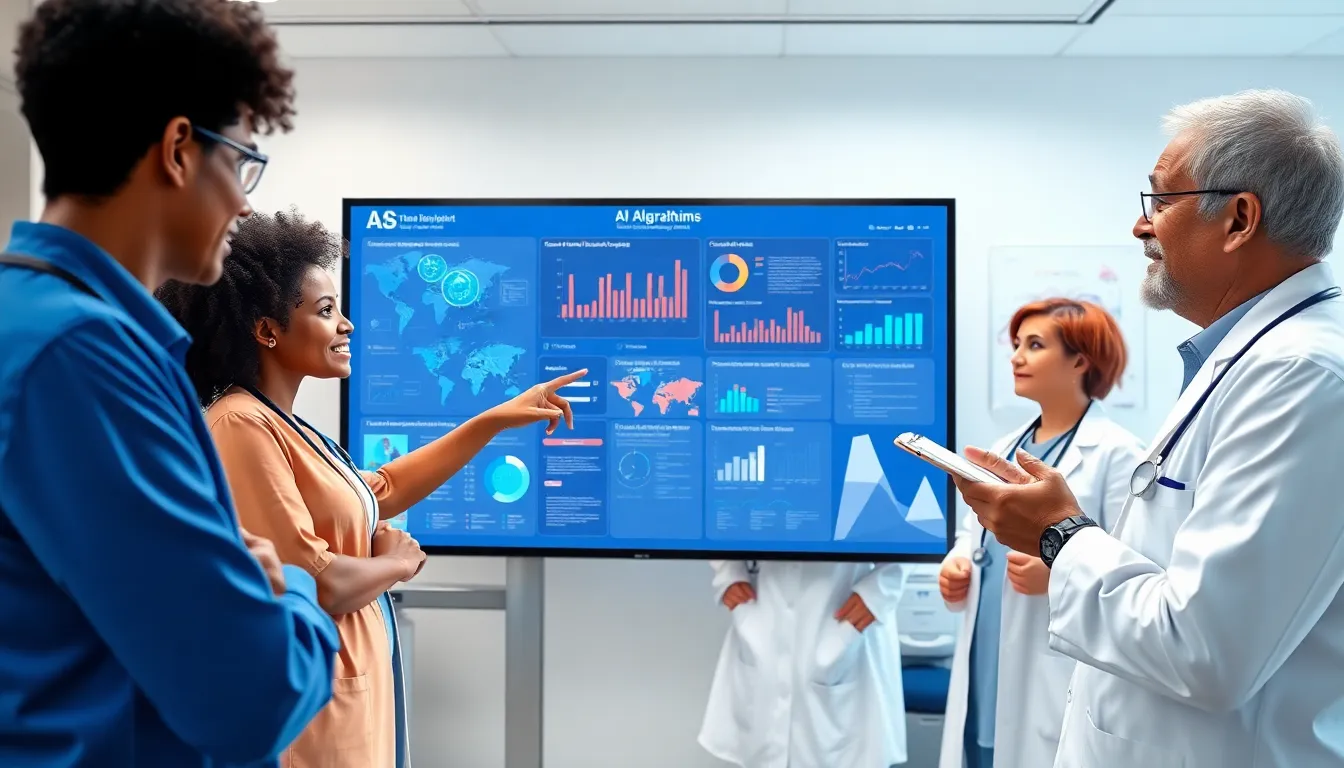In a world where everything from toasters to tractors is getting smarter, the Industrial Internet of Things (IIoT) is leading the charge. It’s like giving your factory a brain and a Wi-Fi connection, transforming mundane machines into data-driven dynamos. Who knew that bolts and gears could have so much to say?
Table of Contents
ToggleOverview of Industrial Internet of Things Companies
Industrial Internet of Things companies are pivotal in revolutionizing traditional manufacturing practices. These firms leverage smart devices and connectivity to enhance operational efficiency. Major players include General Electric, Siemens, and IBM, each specializing in different aspects of IIoT technology.
Innovation drives these companies to create solutions that enable real-time data analysis. Data collected from interconnected machines informs preventive maintenance strategies and minimizes downtime. Businesses adopting these technologies experience significant improvements in productivity and cost savings.
In addition to these giants, numerous startups contribute to a rapidly evolving market. Firms like PTC and Litmus Automation focus on specific niches, such as edge computing and data integration. Their solutions often cater to customizable needs, ensuring flexibility for various operational environments.
Collaboration is key among IIoT companies. Partnerships with cloud providers and AI firms strengthen their technological capabilities. As a result, they can offer comprehensive solutions that address complex industrial challenges.
Challenges persist within the IIoT landscape, including cybersecurity risks and data management complexities. Companies prioritize robust security measures to protect sensitive information and maintain trust with clients. Regulatory compliance also shapes the way these businesses develop and implement their technologies.
Overall, industrial Internet of Things companies play a crucial role in advancing smart manufacturing. Their solutions not only enhance existing processes but also pave the way for future innovations in various industries.
Key Players in the Industry

The Industrial Internet of Things (IIoT) landscape showcases a blend of established corporations and nimble startups, all driving innovation and efficiency. Key players excel by integrating smart technologies into manufacturing processes.
Major Companies Leading the Market
General Electric leads the charge with Predix, its IIoT platform designed for industrial analytics. Siemens enhances smart manufacturing through its MindSphere platform, which connects devices for data-driven insights. IBM’s Watson IoT offers advanced analytics and AI capabilities, aiding factories in real-time decision making. Rockwell Automation focuses on industrial automation, intertwining data and technology to optimize processes. Schneider Electric emphasizes energy management and automation solutions, improving overall operational efficiency.
Emerging Startups and Innovators
PTC stands out with its ThingWorx platform, empowering organizations through augmented reality and IoT solutions. Litmus Automation specializes in edge computing, streamlining data handling for industrial environments. CASAI integrates IIoT with cloud solutions, enabling efficient data management and analysis. FogHorn Systems provides analytics at the edge, enhancing real-time operational insights. Vantiq focuses on event-driven applications, allowing industries to respond dynamically to changing conditions.
Technologies Driving Industrial IoT
Advanced technologies play a crucial role in the evolution of Industrial IoT. Connectivity solutions and data analytics drive operational efficiency and innovation across industries.
Connectivity Solutions
Wireless protocols are essential for ensuring seamless communication between devices. Technologies such as Wi-Fi, Bluetooth, and cellular networks enable real-time data transfer. LPWAN (Low Power Wide Area Network) technologies significantly enhance device connectivity over vast distances while conserving energy. Industrial routers connect machinery to cloud platforms, facilitating data exchange and remote monitoring. The integration of these connectivity solutions allows for enhanced control, visibility, and automation within manufacturing environments.
Data Analytics and AI Integration
Data analytics drives actionable insights from the vast amounts of data generated by IIoT devices. Machine learning algorithms process this data to identify patterns and predict equipment failures. Predictive maintenance techniques enable manufacturers to minimize unplanned downtime and optimize resource allocation. Artificial intelligence further enhances decision-making by providing real-time analysis and automating complex tasks. Overall, the fusion of data analytics and AI leads to smarter operations, improved efficiency, and significant cost savings in manufacturing processes.
Applications of Industrial IoT
Industrial IoT finds numerous applications across diverse sectors, significantly improving efficiency, productivity, and operational strategies.
Manufacturing and Production
Smart manufacturing transforms production lines by integrating connected machines. Equipment monitors its performance, sending real-time data to optimize operations. IIoT enables predictive maintenance, reducing equipment downtime and increasing productivity. Data-driven insights guide decision-making, enhancing workflow and resource allocation. Technologies like AI and machine learning provide advanced analytics, allowing companies to anticipate trends and adapt quickly.
Supply Chain Optimization
Supply chain management benefits immensely from IIoT technologies. Sensors track inventory levels and monitor equipment conditions throughout the supply chain. This data informs real-time decision-making, ensuring optimal stock levels are maintained. Companies gain visibility into logistics, identifying inefficiencies and reducing delays. Enhanced data analytics support smarter forecasts, improving overall responsiveness and customer satisfaction. Integrating IIoT solutions enables a more agile and resilient supply chain, driving competitive advantage.
Challenges Faced by Industrial IoT Companies
Industrial IoT companies encounter several significant challenges that impact their operations and overall effectiveness.
Security Concerns
Cybersecurity threats pose a major risk for Industrial IoT companies. Data breaches can result in sensitive information being compromised, causing severe financial and reputational harm. Companies like General Electric and Siemens must implement robust security measures to protect against these threats. Encrypting data transmissions enhances system security and safeguards operational integrity. Furthermore, an increasing reliance on interconnected devices creates more vulnerabilities. Adopting stringent security protocols, including regular audits and employee training on security practices, remains essential to mitigate risks.
Integration with Legacy Systems
Integrating Industrial IoT solutions with legacy systems presents a complex challenge. Many manufacturers still rely on older machinery and technology that lack connectivity, complicating seamless integration with modern IoT platforms. Companies such as IBM and Rockwell Automation face difficulties in achieving interoperability between traditional equipment and newer smart technologies. Assessing current infrastructure and determining compatibility with IIoT systems is crucial. Implementing middleware solutions can facilitate smoother transitions, allowing better data flow between legacy and modern devices. Prioritizing gradual upgrades ensures that organizations can harness the benefits of IIoT while minimizing disruptions to existing operations.
The Industrial Internet of Things is reshaping the manufacturing landscape by turning traditional factories into smart, data-driven environments. Companies in this space are not just enhancing operational efficiency; they’re revolutionizing how industries approach production and supply chain management.
As major players and innovative startups continue to collaborate and tackle challenges like cybersecurity and legacy system integration, the potential for growth and improvement remains vast. The fusion of advanced technologies and real-time data analytics positions IIoT companies at the forefront of industrial innovation.
With each advancement, they pave the way for smarter operations and significant cost savings, ensuring that industries can adapt and thrive in an increasingly competitive market. The future of manufacturing is bright, driven by the transformative power of IIoT.





